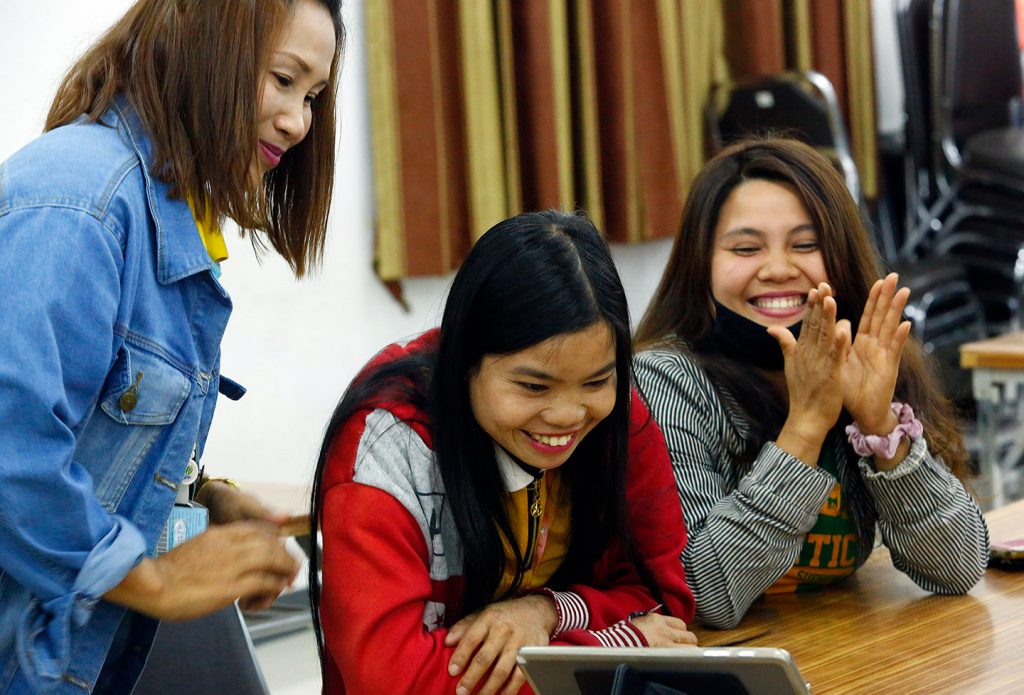Successful pilot from the Nordic Initiative: 2,300 migrant workers and managers in Thailand trained on rights and responsibilities
2019.09.20

nearly 2,300 migrant workers and factory managers in Thailand have been educated using Quizerr.
The recent training of nearly 2,300 migrant workers and factory managers in Thailand indicates increased knowledge in rights and responsibilities and positive attitudes towards using the Quizrr tool. This according to the newly released report compiling the results of the Nordic Initiative’s pilot in Thailand, which has developed and tested a tech-based training on rights and responsibilities. The training emphasizes on ethical recruitment at factories in the food sector in Thailand, which has been criticized for trafficking and abuse of migrant workers. The feedback collected is promising to further scale the training in Thailand to more factories and tiers.
Behind the pilot stands the The Nordic Initiative, which started in 2017 when Axfoundation gathered the leading Nordic food companies in a joint initiative for ethical recruitment and fair working conditions in supply chains in Thailand. Today, the initiative consists of Axfood, Coop, CPF Denmark, ICA, Martin & Servera, Menigo, Norvida, S Group Finland, Unil Norway and Axfoundation.
“Together with Quizrr, the Nordic Initiative has taken the first steps to raise awareness and capacity build all levels at food factories in Thailand. The results are promising and we now would like to see more buying companies joining this effort to improve recruitment processes and working conditions in Thailand”, says Viveka Risberg, program director Sustainable Production and Consumption at Axfoundation.
2,300 migrant workers and managers trained
The pilot has been running during 2019 in Thailand and covered 10 factories which are the suppliers of 9 brands to the Nordic Countries. In total, 2,288 employees, including factory workers from Thailand, Myanmar and Cambodia, as well as middle and upper factory management in the supply chain, were trained using the Quizrr tool. The main aim of the pilot was to create a tech-based training solution for a durable training to improve workplace conditions and recruitment processes in Thailand, for both Thai and migrant workers.
“I noticed that our employees started to discuss more about what they had learnt, such as what kind of rights migrant workers actually have. It has broadened up our knowledge about labour law.” – A manager in one of the factories.
Migrant workers often discriminated against
Thailand has more than 3 million men and women migrant workers from Myanmar, Cambodia and Laos. The food industry is an important sector, and Thailand is a major exporter of fish, poultry, ready meals, canned and dried fruit to Europe. However, because of corruption and weak regulatory systems, it is common that migrant workers are discriminated against, tricked and put in debt to illegal recruitment agents or dishonest employers.
Positive response and new knowledge gained
The evaluation of The Nordic Initiative pilot project in Thailand shows that the factories had a positive experience in using the Quizrr tool and that both workers and managers gained new knowledge. In addition, the implementation teams at factories found the Quizrr digital training and solution easy and flexible for planning the training and provides training cost savings.
“It is rewarding to see how the workers, migrants and Thai, enjoy the training, both the films and the quizzes and also how managers report that relations and attitudes have improved in the factory,” says Sofie Nordström from Quizrr, who is currently in Bangkok with partnering companies and suppliers sharing learnings and talking next steps.
The results from the pilot shows that it was easy and engaging to learn from the Quizrr training because of the short films and gamification approach allowed the trainees to learn using their own language and at their own pace. Statements from a group of Myanmar workers, confirms the results:
“We like the training because it was in Burmese. We could understand the lesson easily and we can read it too. If we can’t read it, some of us can also listen from the voice over… We felt we can relate to the characters in the movie because it felt like our lives.”
All the trainees interviewed said that learning about rights and responsibilities is very important for themselves and the factory, as a whole.
Read more about the Nordic Initiative



















